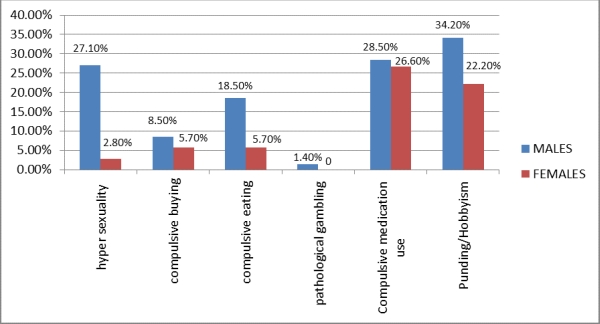Session Information
Date: Monday, June 20, 2016
Session Title: Parkinson's disease: Non-motor symptoms
Session Time: 12:30pm-2:00pm
Location: Exhibit Hall located in Hall B, Level 2
Objective: To assess the frequency and pattern of impulse control disorders (ICDs) and ICD-related behaviours (ICD-RBs) in Indian patients with idiopathic Parkinson’s disease and to assess the determinants including role of bilateral subthalamic nucleus deep brain stimulation (DBS) on ICDs.
Background: ICDs and ICD-RBs are common in patients with PD and cause significant reduction in social and occupational functioning. There are very few studies from India on the determinants of ICDs and ICD-RBs.
Methods: A cross sectional study using a direct, structured interview of 70 PD patients was carried out. Patients, who were diagnosed with PD, based on UKPD society Brain Bank Criteria, with Montreal Cognitive assessment scores >24 were included. All demographic and clinical data were collected including current medications, modified Hoehn and Yahr staging, HADS for depression and Questionnaire for Impulsive-Compulsive Disorders in Parkinson’s disease -Rating Scale (QUIP-RS). Comparison of patients with and without ICDs were done using student t test, Wilcoxon rank sum test and Chi square tests.
Results: A total of 70 patients with male:female ratio of 1.91 with ages ranging from 32 to 76 years were included. The mean age of onset of symptoms was 48.4 [plusmin] 37.5 years with a mean PD duration of 6.9 [plasmin] 3.55 years. 45.7% had ICDs. On comparing PD patients with ICDs and those without, prevalence of young onset PD, dyskinesias, were significantly higher among patients with ICDs. Significantly more patients with ICDs had undergone bilateral subthalamic nuclei deep brain stimulation (DBS) (50%) compared to those without (25%). Among ICDs punding was most common seen in 24 (34.2 %), compulsive buying in 10 (14.2 %), compulsive eating in 17 (24.2 %), hyper sexuality in 21 (30.0 %) and pathological gambling in 1 (1.4 %). Two or more ICD-RBs were seen in 16 (22.8 %) patients. Different patterns were noted in male and female PD patients  . ICDs pattern were similar in both DBS and non DBS patients. Significant correlation was noted between QUIP-RS (A-F) score and PDQ-39 (Pearsons 0.29, p<0.05) and Montreal Cognitive assessment score (Pearson 0.36, p<0.005).
. ICDs pattern were similar in both DBS and non DBS patients. Significant correlation was noted between QUIP-RS (A-F) score and PDQ-39 (Pearsons 0.29, p<0.05) and Montreal Cognitive assessment score (Pearson 0.36, p<0.005).
Conclusions: ICDs are common in Indian PD patients with positive association of ICDs with younger age, dyskinesias and DBS. Impairments in cognition and quality of life was associated with ICDs severity.
To cite this abstract in AMA style:
A.K. Puligopu, P.K. Pesala, V.V.P. Kagita, R.M. Kandadai, S.A. Jabeen, M.A. Kanikannan, R. Borgohain, A. Kumar. Impulse control disorders in Parkinson’s disease – Determinants and effect of DBS [abstract]. Mov Disord. 2016; 31 (suppl 2). https://www.mdsabstracts.org/abstract/impulse-control-disorders-in-parkinsons-disease-determinants-and-effect-of-dbs/. Accessed April 21, 2025.« Back to 2016 International Congress
MDS Abstracts - https://www.mdsabstracts.org/abstract/impulse-control-disorders-in-parkinsons-disease-determinants-and-effect-of-dbs/
